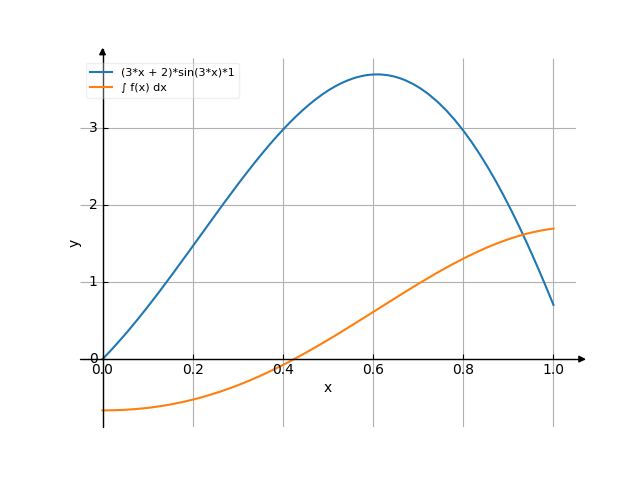Integral of (3x+2)sin3xdx dx
The solution
1 / | | (3*x + 2)*sin(3*x)*1 dx | / 0
Integral((3*x + 2)*sin(3*x)*1, (x, 0, 1))
-
There are multiple ways to do this integral.
Method #1
-
Let .
Then let and substitute :
-
Integrate term-by-term:
-
The integral of a constant times a function is the constant times the integral of the function:
-
Use integration by parts:
Let and let .
Then .
To find :
-
The integral of sine is negative cosine:
Now evaluate the sub-integral.
-
-
The integral of a constant times a function is the constant times the integral of the function:
-
The integral of cosine is sine:
So, the result is:
-
-
So, the result is:
-
-
The integral of a constant times a function is the constant times the integral of the function:
-
The integral of sine is negative cosine:
So, the result is:
-
The result is:
-
Now substitute back in:
Method #2
-
Rewrite the integrand:
-
Integrate term-by-term:
-
The integral of a constant times a function is the constant times the integral of the function:
-
Use integration by parts:
Let and let .
Then .
To find :
-
Let .
Then let and substitute :
-
The integral of a constant times a function is the constant times the integral of the function:
-
The integral of sine is negative cosine:
So, the result is:
-
Now substitute back in:
-
Now evaluate the sub-integral.
-
-
The integral of a constant times a function is the constant times the integral of the function:
-
Let .
Then let and substitute :
-
The integral of a constant times a function is the constant times the integral of the function:
-
The integral of cosine is sine:
So, the result is:
-
Now substitute back in:
-
So, the result is:
-
-
So, the result is:
-
-
The integral of a constant times a function is the constant times the integral of the function:
-
Let .
Then let and substitute :
-
The integral of a constant times a function is the constant times the integral of the function:
-
The integral of sine is negative cosine:
So, the result is:
-
Now substitute back in:
-
So, the result is:
-
The result is:
Method #3
-
Use integration by parts:
Let and let .
Then .
To find :
-
Let .
Then let and substitute :
-
The integral of a constant times a function is the constant times the integral of the function:
-
The integral of sine is negative cosine:
So, the result is:
-
Now substitute back in:
-
Now evaluate the sub-integral.
-
-
The integral of a constant times a function is the constant times the integral of the function:
-
Let .
Then let and substitute :
-
The integral of a constant times a function is the constant times the integral of the function:
-
The integral of cosine is sine:
So, the result is:
-
Now substitute back in:
-
So, the result is:
-
Method #4
-
Rewrite the integrand:
-
Integrate term-by-term:
-
The integral of a constant times a function is the constant times the integral of the function:
-
Use integration by parts:
Let and let .
Then .
To find :
-
Let .
Then let and substitute :
-
The integral of a constant times a function is the constant times the integral of the function:
-
The integral of sine is negative cosine:
So, the result is:
-
Now substitute back in:
-
Now evaluate the sub-integral.
-
-
The integral of a constant times a function is the constant times the integral of the function:
-
Let .
Then let and substitute :
-
The integral of a constant times a function is the constant times the integral of the function:
-
The integral of cosine is sine:
So, the result is:
-
Now substitute back in:
-
So, the result is:
-
-
So, the result is:
-
-
The integral of a constant times a function is the constant times the integral of the function:
-
Let .
Then let and substitute :
-
The integral of a constant times a function is the constant times the integral of the function:
-
The integral of sine is negative cosine:
So, the result is:
-
Now substitute back in:
-
So, the result is:
-
The result is:
-
-
Add the constant of integration:
The answer is:
/ | 2*cos(3*x) sin(3*x) | (3*x + 2)*sin(3*x)*1 dx = C - ---------- + -------- - x*cos(3*x) | 3 3 /
2 5*cos(3) sin(3) - - -------- + ------ 3 3 3
=
2 5*cos(3) sin(3) - - -------- + ------ 3 3 3

Use the examples entering the upper and lower limits of integration.

![Find the integral of y = f(x) = (3x+2)sin3xdx ((3x plus 2) sinus of 3xdx) - with detailed solution [THERE'S THE ANSWER!] (3x+2)sin3xdx](/media/krcore-image-pods/176/hash/indefinite/9/aa/4629bf7ca7bf2bd25caa9ca1dc172.png)
 Integral of e^(2*x)/x
Integral of e^(2*x)/x
 Integral of (4-x^2)^0.5
Integral of (4-x^2)^0.5
 Integral of -2e^(-2x)
Integral of -2e^(-2x)